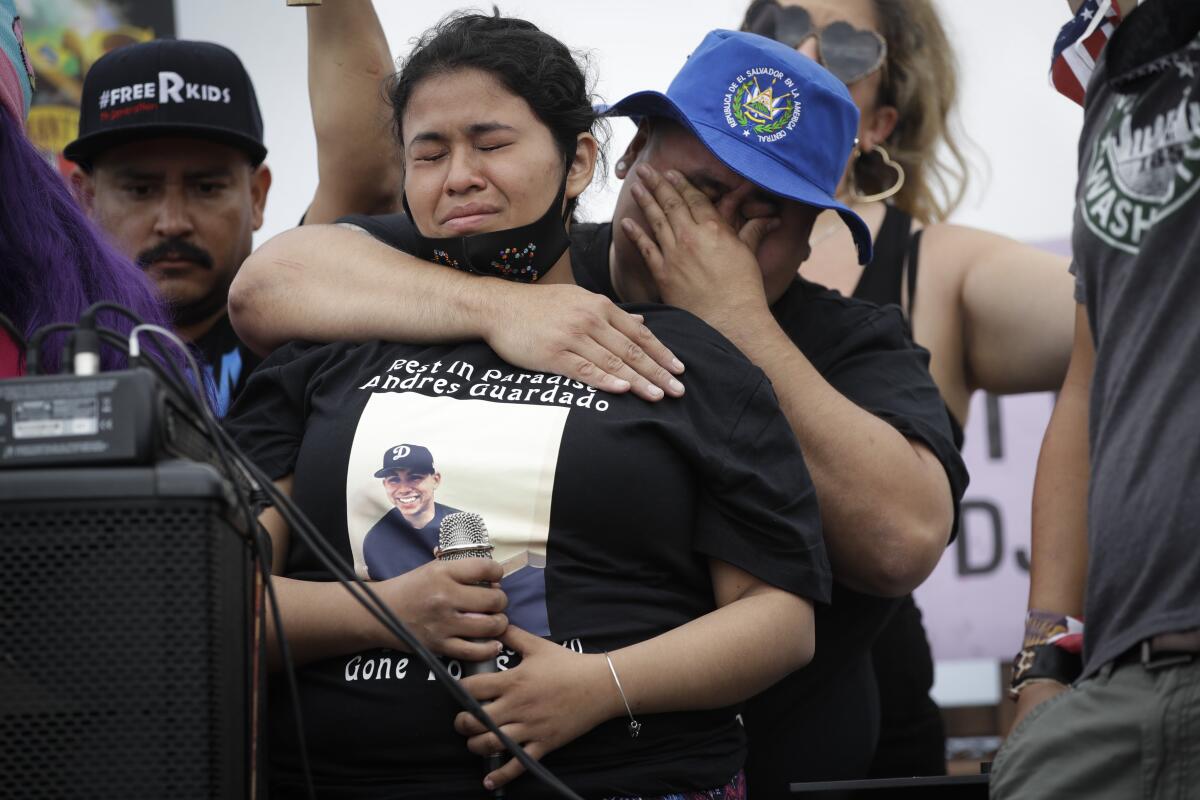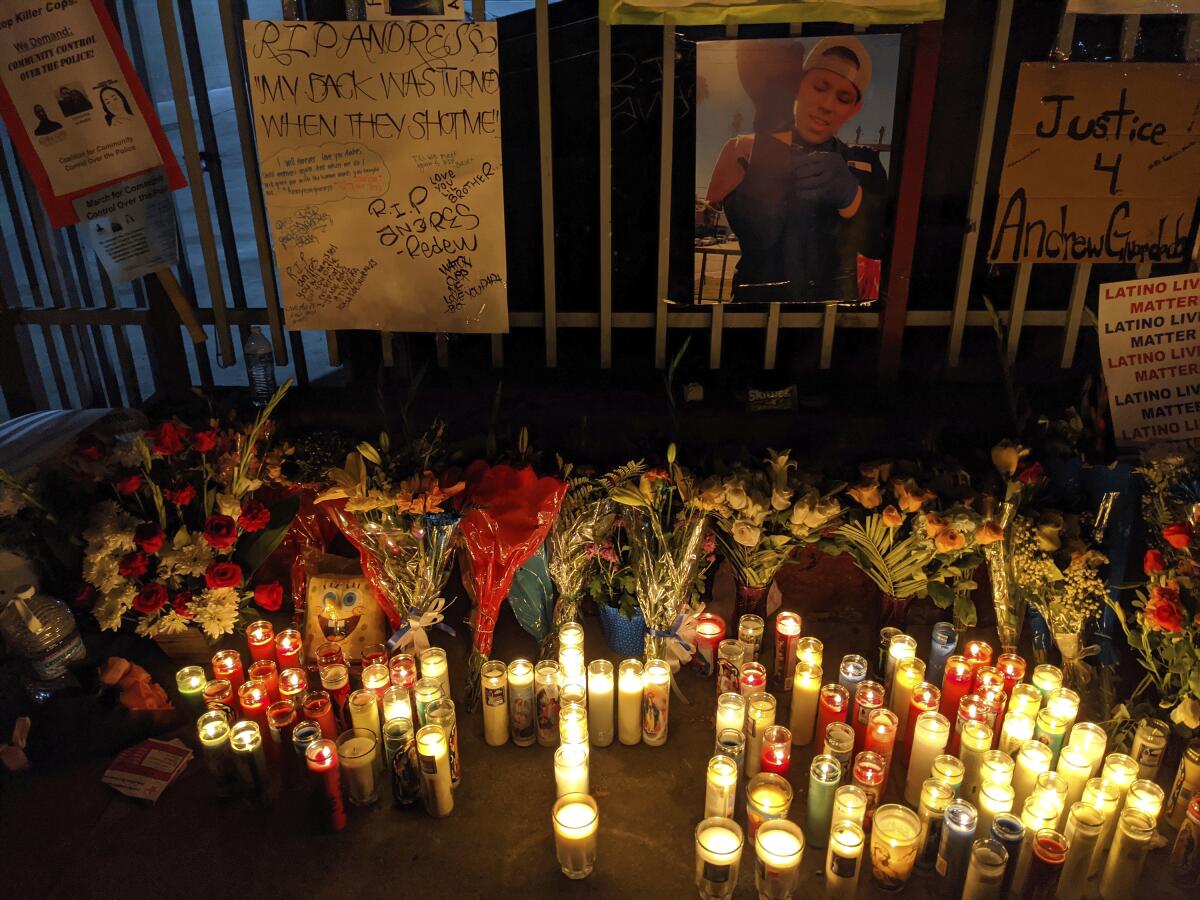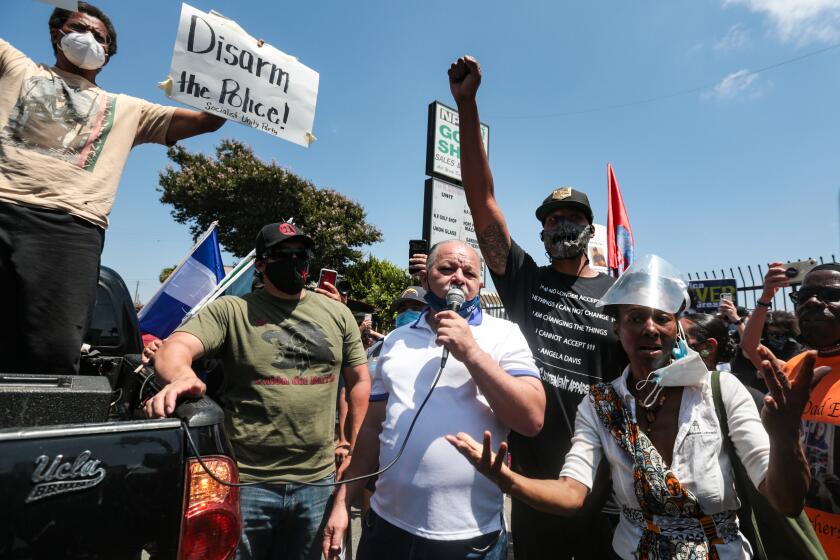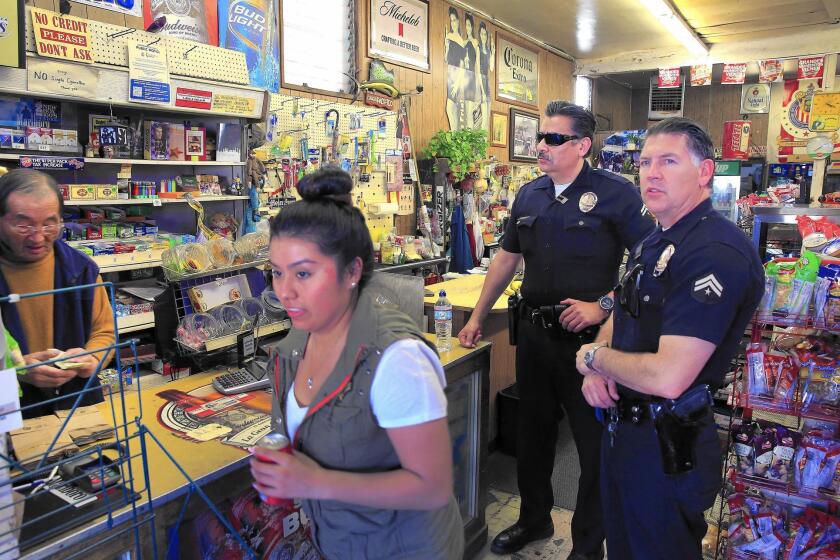What will make people care about police shootings of Latinos?

- Share via
Andres Guardado, shot five times in the back last June in Gardena by Los Angeles County sheriff’s deputies. Sean Monterrosa, shot in the back of his head two weeks before Guardado by police in Vallejo, Calif., while he knelt with his hands up. Manuel Diaz, shot down by an Anaheim officer in 2012 as he ran away.
Will the police killings of Latinos ever end? Have we learned anything from the past?
Santos Rodriguez, a 12-year-old murdered by a Dallas police officer who subjected the handcuffed boy to a game of Russian roulette in 1973. Ruben Salazar, my predecessor as a Los Angeles Times columnist, struck down by a deputy-fired tear gas canister in 1970 as he drank a beer in an East L.A. bar. Edward Melendes, beaten to death in his jail cell by St. Louis police in 1943.
A Washington Post investigation found that between 2015 and 2020, Latinos died at a rate of 23 per million residents after encounters with police, second only to Black people, at 31 per million residents, in a contest no group wants to win.
The Times found that 67% of people fatally shot by Los Angeles police officers since 2018 were Latino, even though they make up about 49% of the city’s population. A 2018 report by Washington University in St. Louis found that Latino men were more at risk than any other demographic of being killed by police in gentrifying neighborhoods or neighborhoods with little diversity.
Cops have abused Latinos en masse too. The Chicano Moratorium, the rally at which Salazar was killed and police officers and sheriff’s deputies assaulted peaceful protesters. The 1969 West High Walkout, where Denver police beat up Chicano high school students marching against police brutality. The 1918 Porvenir massacre, where Texas Rangers rounded up 15 Mexican men and boys and executed them.
The latest victim: Adam Toledo, a 13-year-old killed by Chicago police last week after an early morning foot chase. A video shows the boy dropping a gun and raising his hands a split second before an officer fatally shoots him.
American law enforcement has brutalized Latinos from the time the United States conquered the American Southwest 170 years ago.
Sometimes the victims are armed; sometimes they’re not. It doesn’t matter. Sometimes police officers are justified in their actions. But one unnecessary death is too many. These deaths are a pandemic with seemingly no end, even with more scrutiny today than ever before by politicians, the public and the news media alike.
So a question inevitably, understandably arises among Latinos after each tragedy: Why don’t police shootings of Latinos get more national attention?
It’s a question that the media and activists bring up because it’s partially true. No Latino victim of police violence has penetrated the national conscience like a Trayvon Martin, an Oscar Grant or Breonna Taylor. Multiple theories get trotted out to explain the supposed oversight.
Protests in the wake of the killing of George Floyd – a 46-year-old Black man who died after a Minneapolis police officer knelt on his neck while he was begging for air – have energized efforts to draw attention to deaths of Latinos by police.
The media can’t see beyond a Black-white paradigm and obsesses too much about immigration. Latinos don’t have leaders who can rally thousands of people overnight the way Black leaders can. Latino activists stand down in the name of Black Lives Matter out of respect and wait for the day they can tell everyone about their cause, a day that never seems to come.
Each argument has an element of truth. But wondering why police abuse against Latinos doesn’t get more publicity is the wrong question for Latinos to ask.
The query is racist, for one. The implicit thought behind it is that police violence against Black Americans gets more press at the expense of Latino victims — a callous, selfish critique.
Besides, the issue does receive attention. All of the incidents I mentioned, with the exception of the Porvenir massacre, were covered locally and nationally when they happened. Time Magazine, for instance, labeled the Melendes matter an “outrage” and a “whitewash” at a time when its power was unparalleled in American media and Mexicans barely warranted any stories in its pages.

There are protests — but never very big, and rarely on a nationwide level.
And that’s why the actual answer to this question of apathy is a painful, self-reflective one: Police shootings of Latinos aren’t more widely known because the problem is us.
We too easily forget our history.
Black Americans know too well their community’s legacy of extrajudicial killings. Too few Latinos do about ours. With the exception of Toledo and maybe Guardado, only the most committed “defund the police” types would know the other names I mentioned without the help of Google.
We too easily forget our own role in police brutality.
Theodore Briseño was one of the LAPD officers who beat Rodney King. Windsor, Va., Officer Joe Gutierrez pepper-sprayed an Afro-Latino Army officer in December. Jeronimo Yanez killed Philando Castile in 2016 during a traffic stop in Minnesota. Two Latino deputies shot and killed Guardado. The Los Angeles Police Department, once the domain of racist Southerners and Okies, is now dominated by Latinos who absorbed those attitudes from their predecessors.
The sweeps came on Friday nights in South Los Angeles, often before big events like Raiders games.
That intimate relationship makes it easier for us to look away when police strike and slay Latinos.
Whenever I bring up police shootings at family gatherings, I know how my cousins — more than a few of whom are in law enforcement or married to cops — will respond. Why did the victims resist arrest? You don’t see any of us in those situations. The people who died deserved it because they were probably pandilleros o pendejos — gang members or stupid people.
Latinos proudly and easily assimilate into the American fabric. And part of that process is believing that justice is colorblind, despite overwhelming evidence to the contrary.
Few people know this phenomenon better than University of Arizona professor Roberto Cintli Rodriguez. He has covered police brutality against Latinos for more than 40 years, ever since Los Angeles sheriff’s deputies put him in the hospital after his camera captured them assaulting an unarmed Latino in East L.A. during the 1970s.
“The narrative with too many Latinos is, ‘It’s not us, it’s [Black people]. They have a problem,’” he said. “People call all these cases [against Latinos] anecdotal. People need to see the numbers, and the numbers are outrageous.”
He and others are working on a database of Latinos killed by law enforcement since 2000 in hopes that more Latinos will care. “We’d like to have proportional media attention, but it’s the wrong focus,” he said. “The question is, why do police continue to disrespect red and Black and brown lives? And why do not enough of us care? Until that happens, these killings are just not going to stop.”
Michael Nida, a father of four killed by Downey police in 2011 after being wrongfully suspected of an armed robbery. Antonio Zambrano-Montes, a Mexican farmworker killed by police in Pasco, Wash., in 2015 after he threw rocks at them. Daniel Canizales, a South Gate resident shot 16 times by police in 2019 as he ignored their commands to stop. He survived but will never walk again.
It’s as if Latinos are waiting for our own George Floyd, even though we already have them in droves. Most of us just choose to say nothing. If more Latinos can’t be motivated to care, how can we expect the rest of society to care?
More to Read
Sign up for Essential California
The most important California stories and recommendations in your inbox every morning.
You may occasionally receive promotional content from the Los Angeles Times.













